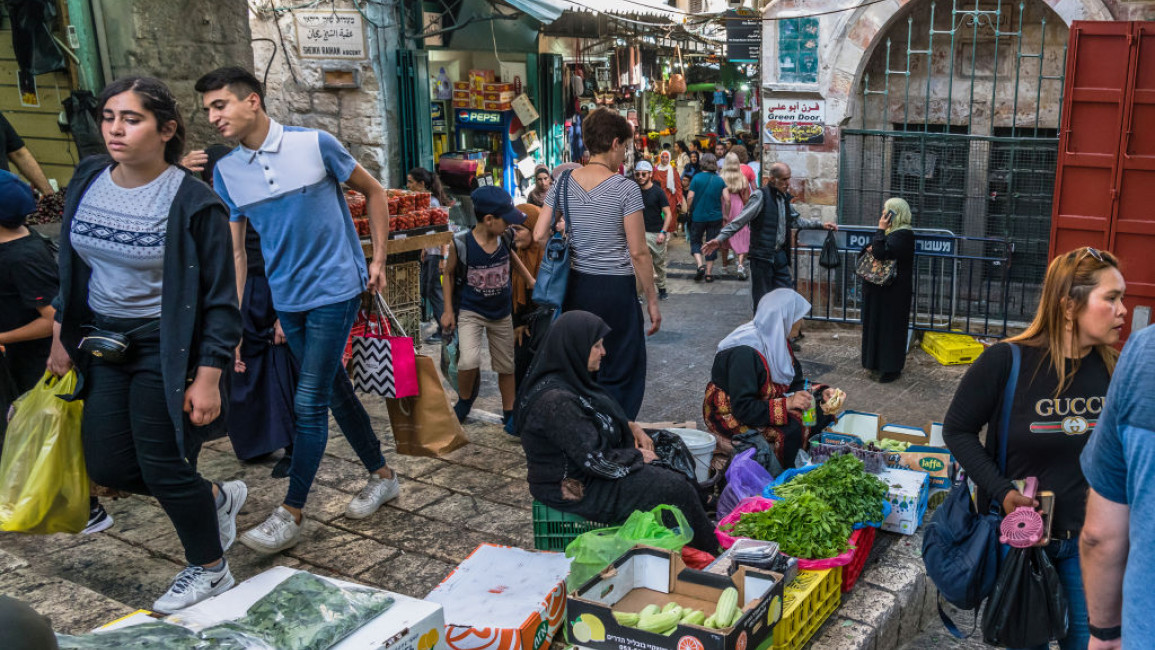'We have to realise our economic power': Palestinians boycott Israeli products for Palestine Economic Week
Palestinians throughout historic Palestine are boycotting Israeli products as part of a weeklong campaign to support local businesses.
Palestine Economic Week began last Sunday, the first day of the week in the Middle East, and will run until this Saturday.
The initiative, which seeks to boost the Palestinian economy, has also seen support for women-owned businesses and faltering markets as part of an imagining of what a liberated future should be.
Lama Shehadeh, 29, an activist with the campaign, said: "We have to realise our economic power and our power in unity in this economic struggle to be able to direct our economic forces into our community."
The Haifa-based architect and urban planner cited the mass action that swept the region in May as a key motivation for starting the movement.
Last month, Palestinians went on a general strike, including inside Israel, to protest Israeli human rights violations.
This included the deadly bombing campaign against Gaza, aggression against Al-Aqsa Mosque, and ongoing attempts to expel Palestinian families in Sheikh Jarrah, occupied East Jerusalem, from their homes.
Now, Palestine Economic Week aims to keep everyone engaged, including after the seven-day initiative concludes.
Shehadeh told The New Arab: "We don't want [people] to stop talking about our struggle and to stop resisting the colonial system the moment… Israel stops bombing Gaza."
She explained this is typically what happens, as people begin to feel the nightmare is over.
"Nothing has changed. We still live under the same colonial system; we're still oppressed."
Shehadeh links her nation's economic woes to the Nakba.
The term, meaning "catastrophe" in English, refers to the ethnic cleansing of hundreds of thousands of Palestinians in 1948 alongside the creation of Israel.
Many activists and scholars consider the process to have continued right to this day, calling it an "ongoing Nakba".
Shehadeh said: "Israel has been stealing our natural resources since the Nakba.
"We are drawn into poverty and unemployment, and we are very dependent on the Israeli economy as cheap labour and consumers of Israeli products."
The grassroots campaign, which doesn't have an official leadership and is decentralised, is running under a slogan best translating from Arabic as, "Buy Locally".
Events encouraging Palestinians to buy local and boycott Israeli products started during the campaign's preparations last week and will continue over the coming days.
These range from farmers' markets to lectures, while stickers have been emblazoned on products to invite people to purchase them.
From cities such as Haifa to smaller towns like Kafr Kanna, and in countless villages, the response has been widespread in Israel.
So too in Gaza and Jerusalem, plus West Bank refugee camps, Hebron, Ramallah and more.
Shehadeh said: "We stopped counting".
In one village, a list of all businesses owned by women and families was distributed by youths to encourage locals to purchase from them.
This is valuable, Shehadeh argued, because Palestinian women are among the most economically marginalised elements in the community.
"We encourage this to empower the weakest among us".
Within Israel's borders, she explained, women's unemployment figures are some of the worst anywhere on earth.
Shehadeh also said the campaign is an opportunity to examine the role of capitalism in a future liberated Palestine.
"We imagine it… not as another capitalist system as [in] Israel that oppress[es] labour… but instead of Israel it's strong Palestinian investors or very rich Palestinians."
This adds to the importance of women's typically home-run businesses, for example, since Shehadeh argued these do not engage in exploitation.
Simultaneously, declining local markets in Nazareth, Jerusalem, Acre and beyond - which have been devastated by this economic model - are being revitalised through cultural efforts this week, including historical tours.
A post from the campaign's Instagram page proudly stated it is "a first step towards breaking Israel's capitalist chokehold over us".
Under the present system, some local authorities in the West Bank have made a stand.
Beitunia, Anabta, Zawata and Beit Wazan have decided to offer tax breaks to businesses without Israeli products.
Moreover, Palestinians in the diaspora and their allies have shown their support for the campaign with many taking to social media to list Palestinian products and businesses followers can support.
Despite this outpouring of support, Shehadeh acknowledged there have been challenges.
The siege of Gaza makes the enclave highly dependent on Israeli goods, making a boycott there difficult. Within Israel, there are often no Palestinian options available, in which case, people are instead encouraged to purchase imported goods.
Although the Israeli authorities have not cracked down on the peaceful economic protest, yet, Shehadeh said Israel's anti-BDS law could come into play.
What's more, the media has largely ignored Palestine Economic Week and, crucially, Israeli shoppers have seemingly started to boycott Palestinian shops.
Shehadeh explained that many Israelis would previously come to Palestinian villages within Israel's borders to save money, or to purchase food.
In June, this seems to have wound down.
Palestinian activists have long advocated an international boycott of Israeli goods through the Boycott, Divestment and Sanctions (BDS) movement.
The peaceful protest movement calls on people around the world to vote with their wallets and pile financial pressure on Israel to end its occupation and violations against the Palestinian people.


![Minnesota Tim Walz is working to court Muslim voters. [Getty]](/sites/default/files/styles/image_684x385/public/2169747529.jpeg?h=a5f2f23a&itok=b63Wif2V)




![Israeli officials are considering exiling Yahya Sinwar to Sudan as part of a deal to end the war [Getty]](/sites/default/files/styles/image_212x120/public/1251837582.jpeg?h=127ba027&itok=UTeIubIr)
![Debris near Rafic Hariri International Airport [Getty]](/sites/default/files/styles/image_330x185/public/2176162423.jpeg?h=a5f2f23a&itok=MCSK9mkM)
![An Israeli air strike on Jabalia killed teenage journalist Hassan Hamad [Screengrab/X]](/sites/default/files/styles/image_330x185/public/2024-10/hassan%20hamad1.jpg?h=c12e0b96&itok=Rd_dyCVp)